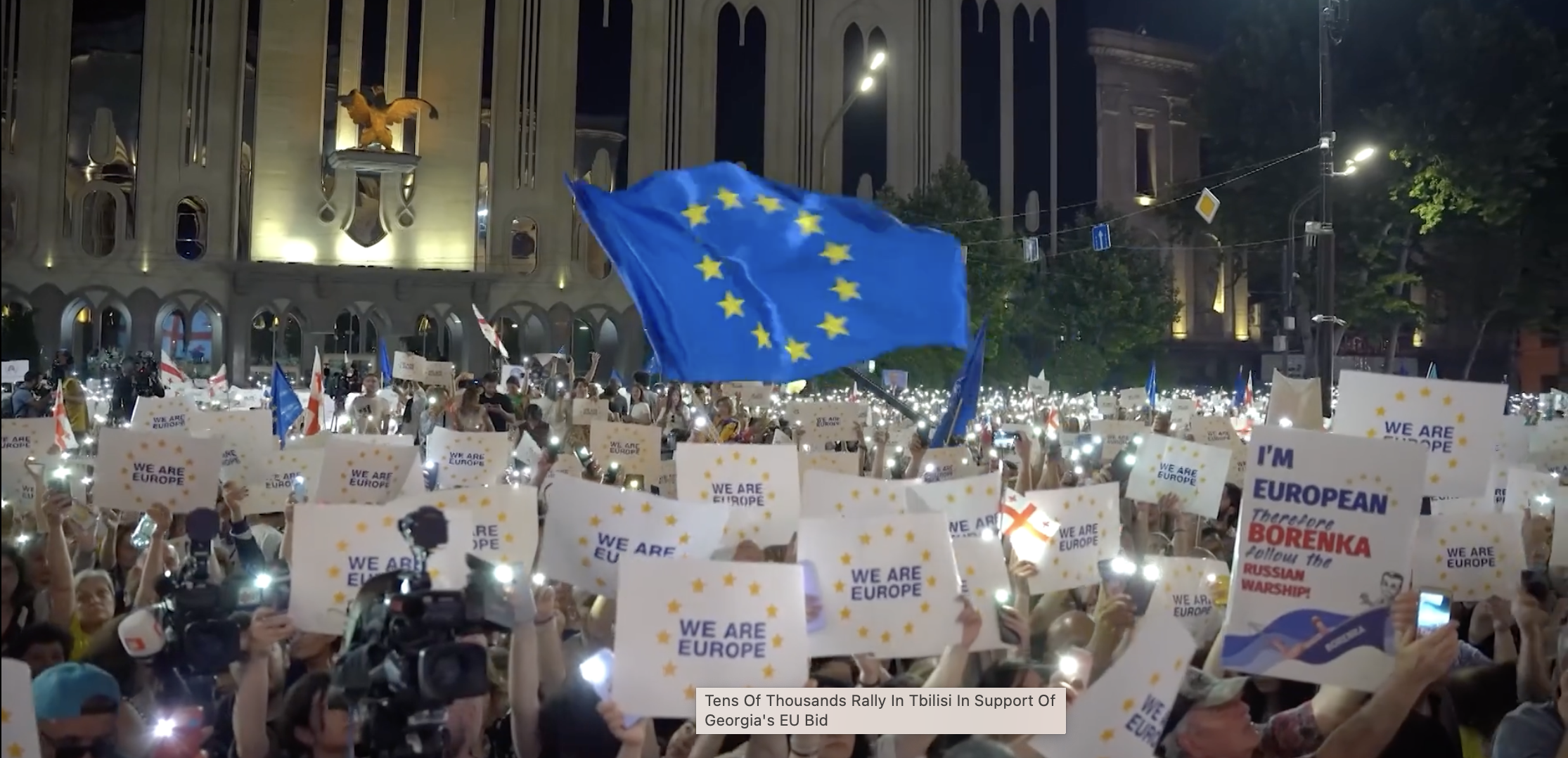
Screenshot taken from Radio Liberty video report from rally in Tbilisi.
Thousands took the streets in Gerogia's capital Tbilisi on June 20 to make their thoughts loud and clear — that Georgia belongs in the EU. The march comes days after the European Commission defferred Georgia's bid for the EU membership. The country is expecting to receive the final decision on its candidate status on June 24.
In an address on June 17, the President of the EU Commission, Ursula von der Leyen said, “We recommend to Council to grant the European perspective [to Georgia] and to come back and assess how Georgia meets a number of conditions, before granting it candidate status.”
Our opinions on the membership applications of 🇺🇦🇲🇩🇬🇪 were carefully assessed based on their merits, as we have always done in the past.
This is a solid basis to move forward together.
Building on this evidence is the historic and political momentum. pic.twitter.com/qz30eCFABZ
— Ursula von der Leyen (@vonderleyen) June 17, 2022
To be granted candidate staus, the country must meet certain conditions, including, reducing the political polarization, reforming the judiciary, ensuring functioning state institutions, strengthening of anti-corruption measures, including de-oligarchisation, and others.
On June 5, Georgians gathered at the Republic Square under the slogan of “Together to Europe.” The march was organized by the citizens and attended by civil society members, including opposition political parties, nongovernmental organization activists, as well as public personas, reported Caucasian Knot.
The ruling government announced its plan to apply for the EU membership in March 2022, following Russia's invasion of Ukrainen — one day after Ukraine made its formal application. At the time, the move was described as a U-turn for the ruling Georgian Dream Party, which up until recently insisted it would not accelerate its initial timeline of applying for membership in 2024.
The “March for Europe,” was organized by the Georgia's Shame movement and other pro-democracy groups in a bid to “demonstrate the commitment of Georgian people to its European choice and Western Values.”
Massive crowds gather in Tbilisi to kickstart rally in protest of the Georgian Dream’s confrontational stands towards the EU and Russia-friendly conduct on Ukraine which they blame resulted in @EU_Commission’s refusal to recommend granting Georgia candidacy pic.twitter.com/FYJHyeEQnd
— Formula NEWS | English (@FormulaGe) June 20, 2022
In #Tbilisi, #Georgia, dozens of thousands joined a #protest rally taking place today in support of the future #EU integration of Georgia:
— Alex Kokcharov (@AlexKokcharov) June 20, 2022
“I am Georgian, and therefore, I am European,” chanted students as they marched towards the parliament building in the capital Tbilisi on June 20.
Crowds also gathered in other cities, including Batumi, Kutaisi, and Zugdidi, according to reporting by OC Media.
Ahead of the Friday's expected decision, Georgia's president Salome Zourabichvili appealed to several member states in a series of video messages shared on Twitter asking to support the country's EU membership bid.
Internal divisions
Georgia has been engulfed in a political crisis since October 2020, when opposition groups contested the results of parliamentary elections won by the ruling Georgian Dream Party. As such, once a frontrunner in the EU integration, the country's internal political divisions have slowed down its prospects.
Since 2020, the country witnessed a decline of press freedoms and numerous attacks on civil society, including the beating of journalists and overall decline of its state of democracy.
“Wherever you look the picture is bad: poor conduct of elections, the politicization of the judiciary, the way the authorities failed to prevent violence against journalists and Gay Pride organizers in Tbilisi, revelations about surveillance of EU diplomats,” wrote Tom de Waal, a Senior Fellow at Carnegie Europe and a long time observer of Eastern Europe and the Caucasus.
On June 9, the European Parliament adopted a resolution on “on violations of media freedom and the safety of journalists in Georgia.” The document also called for imposing personal sanctions on the founder of the ruling Georgian Dream party, former Prime Minister Bidzina Ivanishvili “for his role in the deterioration of the political process in Georgia.”
Ivanishvili is a key figure in Georgian politics. He made his fortune in pre-Putin era in Russia and founded the Georgian Dream party in 2012. Although, Ivanishvili publicly announced his decision to leave politics in 2021, some believe he is still calling the shots.
Rushing to Ivanishvili's defense and criticizing the wording of the resolution, Irakli Kobakhidze, the chairman of the ruling Georgian Dream party said, “It is deeply concerning that even such a high-ranking EU institution has fallen victim to one of the major maladies of the contemporary world, the so-called fake news,” in a June 9 press briefing.
It is this divisive narrative channeled at rivals at home and allies abroad as well as the country's democratic backsliding that is reducing Georgia's chances at EU membership.
And although the rally on June 20 signals that the majority of Georgians including the country's president Salome Zourabichvili favor the country's place in Europe, it is unlikely that it will change the EU leaders’ final decision this week during the European Council meeting to be held on June 23–24.






